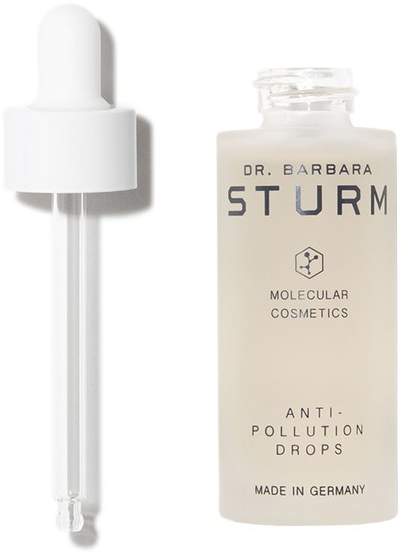Ask any skincare expert and they’ll tell you that prevention is key, routine is a must and sunscreen is a no-brainer. But we’ve entered this weird age where the sun and the wind are no longer the only elements we need protecting from; nowadays, we’ve got air pollution flooding our lungs, suffocating our skin and even increasing our risk of psychosis! Anti-pollution skincare has rapidly become a new global market aimed at those wanting to protect their skin from the ageing effects of urban smog, although I question the efficacy of these in the grand scheme of things. Part of me also feels that while it’s forward-thinking, it’s also an undeniably tragic adaptation to a world growing dirtier by the day. An acceptance, of sorts.

If we take a look at the history of life on Earth, one theme runs strong: the most successful species are those that adapt to their changing environment. We humans are no exception, though we are the only species that force ourselves to adapt to a world that we ourselves are ruining. Why struggle on when we could actually stop the dire trajectory? Ask any evolutionary biologist and she’ll tell you that adaptation is no overnight process. So why do we do it to ourselves, then? In fact, the problems we’re facing now in the Anthropocene are a result of our changing the environment faster than life on the planet can change to keep up with it. It leaves us treading dangerous water.
Here in the UK, London beauty houses Liberty and Cult Beauty have reported booming interest in anti-pollution cosmetic offerings and it’s really no surprise. A day hopping on and off the tube leaves my eyes irritated and nose full of black gunk that looks both gross and shocking when I stare at it on the tissue at the end of the day. It’s utterly shameful that over 9,000 people a year are killed in Britain’s capital due to urban smog. Thought to be of the same risk to health as obesity and alcoholism, air pollution is the silent epidemic to which we’re not paying nearly enough attention.
Air pollution damages our skin by causing oxidative stress. At an aesthetic level (which is vital to our confidence, so I won’t pretend for a second that it isn’t important!), polyaromatic hydrocarbons and volatile organic compounds have been associated with aging, pigmentation and acne. But deeper than that, unhealthy skin is less able to protect what hides underneath it and at greater risk of developing cancer. As oxidative stress increases due to repeated exposure to harmful compounds, we suffer from genetic damage. Signaling pathways that are essential to cell growth and repair are hindered, so the skin is unable to heal itself as effectively.
The bulk of the aforementioned pollutants come from car fumes, plastic production, pesticides, textile dyes, paints and varnishes. These are things that are integral to life as we know it, but we must work hard to replace with gentler alternatives if we want healthier bodies. But in the meantime, protect ourselves we must.
Anti-pollution makeup typically includes antioxidants like Vitamin C that in theory fight off rogue free radicals before they can cause the aforementioned and dreaded oxidative stress. The problem is that there’s no guarantee that once potent ingredients like ascorbic acid (the fancy technical name for Vitamin C) are blended with a concoction of other chemicals to bring a nice lotion and potion into your pot, that it’ll do a whole lot. Chemistry is a complicated thing, after all. Particularly when some of these compounds are prone to degradation from daylight.
Then there’s the likes of Pollustop, a polysaccharide added to products like Ultrasun’s Antipollution Fluid SPF 50+ that forms a non-occlusive film on the skin, shielding the face from heavy metals and other particulate matter. A similar compound is found in Dr. Barbara Sturm’s Anti-Pollution Drops—a cult favorite with urban beauty junkies. This one uses a marine-derived polysaccharide to serve as a barrier and combines it with ingredients to also help brighten and renew the skin. The barrier concept is great in theory, but our face is only a small percentage of our total body skin. What about the rest?
Barbara Sturm Anti-Pollution Drops
With many of these products leaving your wallet looking a little sad, I question whether they’re worth the investment. If money is no object for you, I believe they certainly will do no harm and are likely a great addition to a robust skincare routine, but if you haven’t yet got that in place, don’t think these will save you. Double-cleansing, acid toning, a clever serum and nourishing moisturizer can’t ever be substituted by one anti-pollution product, so I’d recommend starting with your basics first. Make some effort with your overnight routine and remember that what you put into your body also plays a huge role in how your skin looks long term.
Finally, remember that the effects of filthy air stretch far further than how much of a glow you’ve got. With mental health and sleep affected by urban smog, we’ve got more to worry about than a wrinkle or two. How can you contribute to the clean up?
Are you a fan of anti-pollution makeup? What products do you swear by?
Also by Kat: Could We Save The Planet By Being A Bit More…French? Hear Us Out
I Did A 30-Day No Makeup Challenge. Here’s What Happened
Get more like this—Sign up for our daily inspirational newsletter for exclusive content!
__





